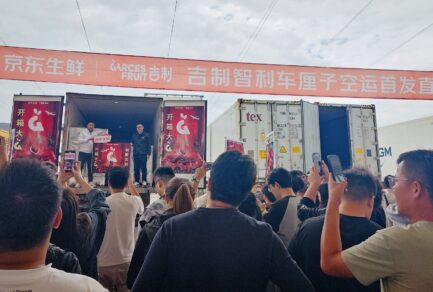Mar 16, 2020|
Wall Street Journal Highlights JD’s Omnichannel Fulfillment Program
by Ella Kidron
A Wall Street Journal article, “How China kept its supermarkets stocked as coronavirus raged,” published on March 13th, highlighted the role of JD’s supply chain innovation program, Omnichannel Fulfillment, in ensuring supply of necessities during COVID19. The story provides a comprehensive picture of food supply by private and public institutions during the epidemic period.
The article writes, “JD.com said that when inventories in its warehouses for products like rice, flour and oil started getting tight, it was able to source additional supplies from offline businesses – including mom and pop stores – that were open and closest to customers.” Since demand for these products is generally higher offline in normal circumstances, when the majority of people were remaining in their homes at the start of virus the outbreak, JD turned to its Omnichannel Fulfillment supply chain innovation program.
When a consumer places an order online, the platform matches the order with offline supply closest to the customer in real-time, and then arranges for a courier to deliver to the consumer among the most efficient route. Instead of relying solely on the stock in JD’s warehouses, the omnichannel fulfillment platform will calculate which brick and mortar stores nearest to the customer has the items in stock, and then source the inventory from there, both ensuring supply and delivery speed.
The article also mentions that, “Private companies, including JD.com Inc. and Walmart Inc., rerouted trucks and located supplies that otherwise might not have made it to market.” Early on in the outbreak, JD established a special channel to provide fast aid to Wuhan, the epicenter of the outbreak, from across the country. At the same time, the company relies on priority logistics channels to distribute a variety of materials. The goal is to ensure the fastest delivery of the most urgent materials while ensuring the maximum utilization of limited capacity resources. JD also implemented re-routing and inventory planning schemes to avoid goods that need to go to other regions from having to be transferred or sourced via Wuhan, reducing bottlenecks in getting emergency goods to Hubei province.
At the same time, JD launched “Mobile Fresh Basket” to provide a convenient and reliable way for people in Hubei province to get fresh produce that was already around them instead of it having to come from elsewhere. Mobile Fresh Basket sources from three channels for the produce: JD’s Friends Shop Program – a group buying mini program for communities, B2C inner city distribution of fresh products directly from wholesale markets to housing compounds, and government partnerships with agricultural enterprises. JD Logistics picks up the produce and delivers it directly to residential compounds. Following an initial launch in Hubei, Mobile Fresh Basket has expanded to over 50 cities.







 JD’s “Online-Clubbing” Drives Liquor Sales
JD’s “Online-Clubbing” Drives Liquor Sales



